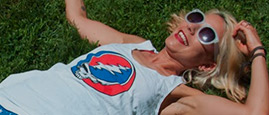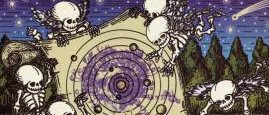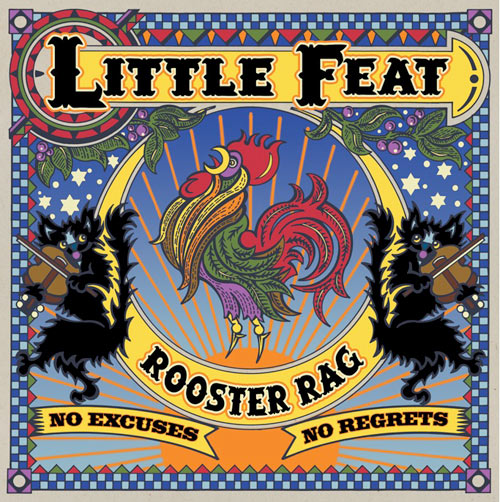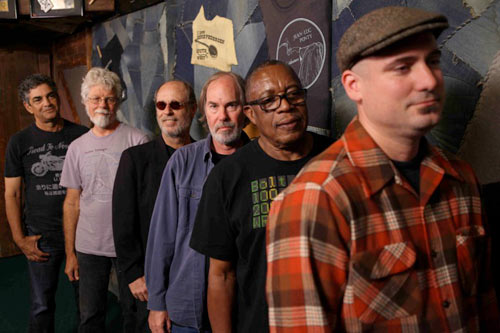The world is a better place with Little Feat in it. Far from being some nostalgia act riding the coattails of its long departed co-founder/leader Lowell George (who died in 1979), the band has continued to make cool, vital music with nearly all the members of its classic lineup—guitarist Paul Barrere, keyboardist Bill Payne, bassist Kenny Gradney, and percussionist Sam Clayton, along with Lowell-era multi-instrumentalist/songwriter Fred Tackett—plus new drummer Gabe Ford, the very able replacement for original Feat skinsman Richie Hayward, who died two years ago. Since their 1987 post-Lowell revival, they’ve made a number of fine albums—my favorites are Let It Roll (1988), Ain’t Had Enough Fun (1995) and Kickin’ it at the Barn (2003), all of which I heartily recommend. And they’ve remained one of the best live bands out there, dispensing a rootsy blend of rock, funk, blues, country and New Orleans spice that adds up to that unmistakable Little Feat sound.
Their excellent new disc, Rooster Rag, is Little Feat’s first studio album of new material in nine years, and the reason we’re writing about it on a Grateful Dead web site is that four of the 12 songs were co-written by Robert Hunter and Feat keyboard wizard Bill Payne. (The duo have collaborated on six others that didn’t make this album, but may turn up down the line.) The four tunes are the bouncy title cut, the country barndance number “Salome,” an ode to car culture called “Rag Top Down,” and the driving “Way Down Under,” which may be the most classically “Hunter-esque” of the lot. The other songs on the album also showcase Little Feat at their best, particularly a pair of unusual Fred Tackett tunes—“Tattooed Girl” and the mysterious, Los Lobos-ish “A Church Falling Down”—and Barrere’s nicely rendered version of Mississippi John Hurt’s “Candyman Blues.” Throughout there’s a beautiful and imaginative layering of acoustic and electric textures.
It’s no secret that there’s always been a huge overlap of Dead Heads and Feat fans. The two bands, though not that similar musically, have many shared roots, a commitment to adventurous playing and unique, slightly twisted worldviews. They were always idiosyncratic fellow travelers. There have been direct connections, too. Lowell George co-produced the Dead’s Shakedown Street album in 1978. A decade later, Little Feat opened a pair of much-loved Dead shows in Oxford, Maine (7/2-3/88) and at Autzen Stadium in Eugene on 6/24/90. Bill Payne and Paul Barrere played on and off as part of Phil Lesh & Friends between the fall of ’99 and the summer of 2000. Little Feat has played “Tennessee Jed” many times since 2001, “I Know You Rider” less often, and occasionally teased “Dark Star” and “Scarlet Begonias” during their medleys. And Little Feat’s current manager is former Grateful Dead manager Cameron Sears.
I spoke with Bill Payne on the phone from his rural Montana home, which sits on 20 acres, has a river running through it and is just 22 miles from Yellowstone National Park. I wish I had a high-quality audio version of the interview, because he often punctuated his comments by stepping over to a piano and demonstrating some musical point.
Besides touring incessantly with Little Feat, Payne also has a solo show that combines music, stories and his top-notch photography—so keep an eye out for that! He has had an amazing career playing keys with dozens of artists outside of Little Feat, including Jimmy Buffett, James Taylor, Emmylou Harris, Jackson Browne, Bonnie Raitt, Taj Mahal, John Lee Hooker, J.J. Cale; the list goes on forever. But our conversation focused primarily on the songs he wrote with Hunter.
I just recently heard that you do a solo show. What’s that all about? And why haven’t you come to San Francisco with it? [Laughs] I’d like to go to San Francisco! What the show entails is me poppin’ up in front of an audience and sharing an intimate side of what I do and what I’ve done. Like, “Here’s the first music my mother played for me,” which had Les Paul and Mary Ford on it, “Vaya Con Dios.” And then there’s the very first piece I played for my music teacher, which I wrote out. [He plays “The Ballad of Davey Crockett” New Orleans-style]. I didn’t play quite like that back then. I play various other things, including a couple of songs that were not on this record. I have ten songs I’ve written with Robert Hunter. I’m a pretty good photographer, too, so that’s part of what I do. I present some of my poetry—I read a piece called “All Out of Innocence” that goes over 15 or 20 of my photos. It’s connected to a piece called “Through the Eyes of a Child” which is on my Cielo Norte solo record [from 2005]. So, it’s show and tell.
I want to show people how a guy with very small hands and a big imagination and a really good background in music can make things happen.
I gather it was Cameron Sears that suggested you and Robert Hunter collaborate.
That’s right. Originally, Robert sent some lyrics which Paul and I both looked at, and I think Paul sent him some music and wanted to make a few changes with Hunter’s lyrics, which [Hunter] was not agreeable to. So that didn’t work out. Then I wrote this one song, “What Are You Waiting For,” and it turned out pretty cool, so Hunter and I were off and running. That one’s not on the record. “Rooster Rag” was one of the first ones that came down the pike.
What was the process like?
Well, I’ve never met the guy. We’ve never spoken on the phone. I Googled his picture to see what he looks like! [Laughs] So far it’s all been over the Internet. Robert is a very private guy, and I don’t sit there and analyze his lyrics. But what I did with all this freedom I was given to write with him, I’d sit there and figure, “Well, this is obviously a chorus, that’s great. And this looks like a ‘B’ section or maybe a bridge,” and I’d start working things out.
Were you making demos along the way and sending them to him?
Yes. This embarrassing to admit, but I’ve never, ever set up a microphone in my house. Not once. And the only way to communicate with this guy was you do that: “All right, I’m diving into the deep end of home recording now,” which I could do just using synthesizers and whatnot, but with the voice it was, “Now what do I do?” [Laughs]
Had you never recorded a piano acoustically on your own?
No. I’ve got a great piano, too. It’s one I chose for the first Emmylou Harris album [Pieces of the Sky] for “Boulder to Birmingham.”
One of my all-time favorite songs.
Mine, too. The piano is a Yamaha 7-footer, and I’ve used it on a lot of records. I’m sure Emmylou and Brian Ahern [her producer and husband in that era] probably still consider it their piano even though I bought it. [Laughs].
At any rate, what I’d do is sit here at the piano, and with my iPhone I’d record into iTalk, just to get the basic idea of what I wanted to do, and then I would move over to the synthesizer, to the sequencing mode, and I’d work on it there. In the beginning I was just showing him the track with the piano and a voice.
When I lived in L.A., I would record anywhere from 10 to 30 tracks, even doing orchestral things, using Vision software through and SE30 [Mac]. I did Cielo Norte through an SE30. Now I use Pro Tools.
But the actual writing process on “Rooster Rag” went something like this. I’d sit down and start to figure out where I’m going with it rhythmically and melodically and chordally, and then I came up to “Tubal Cain / god of fire / he got doused one good rain” and I thought, “I’ve gotten this far with this song, and it’s a rag, but I don’t have any real ragtime chords in it, so I thought “Tubal Cain” [demonstrates on piano] and came up with some changes that would reflect the ragtime. [Tubal-Cain is a figure in the Hebrew book of Genesis, a descendant of Cain.]
Rag syncopation.
Right. Then later on in the song, I was actually thinking about Levon Helm. There’s a line “kings of creation” [demonstrates again, and sings like Levon]. I threw in this real solid chord—when you throw that C over the G it submits it even more. I was scoring Hunter’s lyrics; I almost had a visual on it.
What you might not know about Hunter is that even though you may not have been thinking specifically about what he might turn over to you lyrically, chances are he was thinking about what a band like Little Feat might do with it to a degree. Not down to a specific chords or approach. But I would suspect the reason he might give you a lyric like “Rooster Rag” or “Salome” — with its allusions to Southern foods — may be because he knows what Little Feat can do.
I would think so. And even if he didn’t, we were on the same wavelength with a lot of things. He’d say, “Are you familiar with Highway 9?” which is in the song “Ragtop Down.” I said, “I don’t specifically know Highway 9, but I went to high school in Santa Maria, California, and you were up in San Luis Obispo,” so that’s the start of all this stuff about car culture and cruising that’s in that song.
The guys in my early bands were all slicked-back hair, working on their cars; that kind of stuff. I was a surfer and these were older guys. They were the guys who got me laid the first time. [Laughs]
Was the Columbia Records pressing plant already in Santa Maria when you were growing up?
It was. In fact there was a record that we had pressed there for this group I was in called Something Wild, which was on Psychedelic Records. Acid Head Productions.
Was it either?
[Laughs] I had no idea what acid was or any of that until about a year later; maybe less. But when I went to L.A. and met Lowell George, I also met Elliot Ingber, who was the guitarist with the Mothers and then was with Richie Hayward in Fraternity of Man. Elliot pulls out that [Something Wild] record! I said, “How the hell did you get that?” He said, “I saw it in a record store, Billy, and I thought, ‘Man, this stuff is way ahead of its time. Who are these people?’ That wasn’t my group or anything; it was this guy Kal-X Blue, this East German singer [real name: Karl Gebhardt] who was a complete maniac.
Until recently I haven’t really even thought of myself as a singer…
You’ve been singin’ a while…
I’ve been singing a long time, but when you’ve got guys like Lowell George and Paul and later, Craig Fuller and Shaun Murphy, I usually deferred to them, and I would only sing things like “Representing the Mambo” or “Gringo” that only I could sing. Then I figured, if I can sing “Oh, Atlanta,” then I could sing that Bob Seger song “Something in the Water.” Then when Shaun was no longer in the band, I started singing a little bit more.
And no one left the theater!
No one left. In fact, one reason I’m doing these solo shows is because I finally have the confidence to get up in front of people and play and sing with or without a band. It’s only taken me 63 years to figure it out. [Laughs]
How about the song “Way Down Under”? There’s something about the cadence of that song that reminds me a little of “Touch of Grey,” but it’s still got that rolling Little Feat momentum.
That was one where Robert asked if I could kick-start the process.
You mean send him a tune and he would set lyrics to it?
Yeah. It didn’t have a melody to it, but it had a basic structure. And the challenge every time was to say, “OK, here’s what he wrote to. Do I need to extend the music to make it more of a complete idea, or how do I take it? Every little song was its own little Rubik’s Cube, so it was challenging but it was fun.
When Hunter and Garcia would write together there was occasionally some back-and-forth about a word or a line that might not sing as well as others, or a rhythmic thing where a different syllable might be called for. Did you do those kind of minor alterations?
There were a few. Before I sent him anything I might say, “I’m having a little trouble singing this line,” and he’d say “OK, try this.” Almost immediately. It was always better, and amazingly so. But if I had to change something on a rare occasion, we worked it out. We got into a good pattern with one another.
I felt like I had a lot of freedom. So, I might think, “This section here, even though it’s written in verse terms, I’m turning it into a B section.” I might throw different chords on it that might not apply to what I wrote earlier, which means it’s a different melody. That’s what I loved about “Rag Top Down.” Not only devising a musical setup to it, but the idea of listening to Miles Davis’ “All Blues” and throwing in this little thing. [He plays a riff that recalls “All Blues”] I had these chords that were a little jazzier, and then it comes back to it. It’s real subtle stuff, but what it does is it takes your ear, whether you’re conscious of it or not, and most people won’t be—and it’s like setting down a solid marker beneath it. Also, I switch up the rhythm part when I’m talking about “San Jose”—it’s like, if you’re riding in a car that’s a turbo, when you shift gears the car almost sags toward the pavement, and then it picks up and now you’re really off to the races. So I wanted to create a musical version of that. But it’s not like I was laying in the weeds all night thinking about; it just kind of happened.
Here’s a melody, here’s a rhythm, here are chords, this is what it means to me. I don’t want to sit there and analyze what I think he means or even what it means to my approach.
On the song "Way Down Under, did you have any inkling what he might come back with lyrically?
No, not at all. There they were, I looked at them and they were really fun to sing. I love that line about “where did your Chihuahua bury his bone?” How cool is that? [Laughs]
Well, I’d say that Little Feat has a long history of intriguing lyrics. Certainly Lowell was oriented in that direction from the beginning. So you guys could always go that way or to the more down-home, rootsy thing.
It’s always been really wide open. We create characters and scenarios; we’re writing little stories, little movies, little portraits of things. That’s why Robert was such a good fit. To be honest, I was worried about it at first. I wondered if I’d have the latitude as a songwriter to write like I did on, say, “Red Streamliner,” or others where I take it some different places musically and which are representative of my background. In fact, the ten songs that Robert and I have written so far go from very cinematic, in the sense that they’re very visual and take you places, to simpler things.
A song like “Salome” has the slide and the mando and the fiddle [guest Larry Campbell] and all these interlocking pieces. And “Rooster Rag” has the acoustic guitar and mandolin and then the horns come in later and Sam [Clayton] comes in with his distinctive vocals. What is the process of group arrangement like for songs like these that you write?
Because it’s a band and because the band is Little Feat, you give people latitude to see what they’d like to play on it. It doesn’t take very long to have that thing happen. I go up to Clayton and I say, “I want to have you and Paul and Fred sing on this, and here are a few notes to start with.” They try it: boom! “That sounds good, let’s double it.” Paul puts some slide on…
And it instantly sounds like Little Feat.
It does. We can play “Happy Birthday” and it’s going to sound like Little Feat. [Laughs]
That’s one reason we put the band back together, even without Lowell. The first realization I had—and I’m sure Paul felt the same—was, “This sounds so much like us, it’s crazy!” And why shouldn’t it? Of course you miss the component of Lowell’s genius as a writer, as a singer who can phrase music, his guitar playing—though Paul has stepped into that part in a really brilliant fashion. At the end of the day, do you honor who you’ve worked with and do you maintain a sound that is recognizable to people, but still moving forward in some way? I think we do.
Some people are going to drop it off at the curb: “I only liked Bob Dylan when he just played acoustic guitar. I don’t like this electric shit.” [Laughs] So you always have that— there are purists who don’t want to hear Little Feat without Lowell. But here we are doing what we do.
And doing it really well.
I like to think so. I hope so. Were still having fun with it.
What did your time with Phil, when you and Paul were playing with him, do to your playing or your approach?
Well, it was the material first and foremost. People always used to say, “Oh, Little Feat remind me of the Grateful Dead on some level.” And I’d think “Really?” I didn’t hear that at all.
I don’t hear it much musically, either, but there was a certain simpatico thing.
Here’s where I started to figure out what some people meant by that. It was that the music was different, but the approach was similar. If you needed eight bars to say something in the first verse, fine, but why did you put in ten bars the second verse or why did you go to six bars on the last verse? The Dead would do that kind of stuff all the time, and it was a matter of what they felt they needed to say. And Little Feat was like that, too.
What I got out of working with Phil was a reintroduction to that way of playing. Because in the old days, I played with jam bands and we did the same kind of stuff. To be honest, I never found it all that interesting to sit on one chord for half and hour, but Phil doesn’t do that. The jams go to some really interesting places. When he’d get in a directorial mode, where it was “watch my hand signal here,” or, he’d talk into the mic and we’d shift into the minor key, or whatever it was,” these are things Miles Davis used to do, or Frank Zappa used to do. Miles would hold up a hand and they’d know to go to a “C” section, or maybe a “D” section from another song. That’s what Phil was doing and I thought that was a pretty nifty way of directing traffic onstage, and it was nice to see how far you could take it in terms of dynamics within a song, or tracking people and following them.
Ultimately it’s a not a style I embrace all that heartily with most things I do. But it did loosen things up considerably and for that I thank Phil!
* * *
For more on Little Feat, the new album and watch a cool video of “Rooster Rag” check out their website.
You can also listen to a stream of the title track here.








